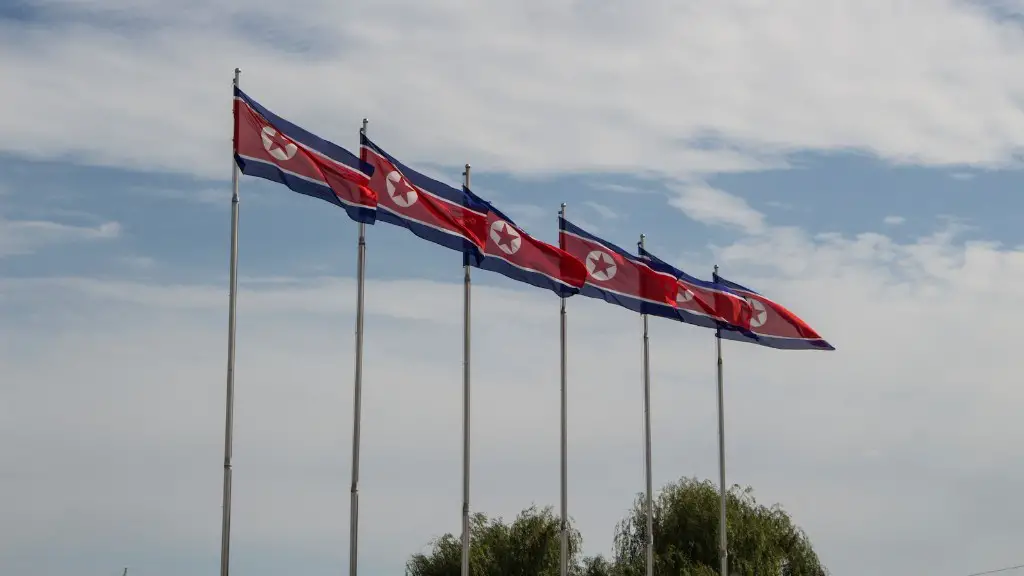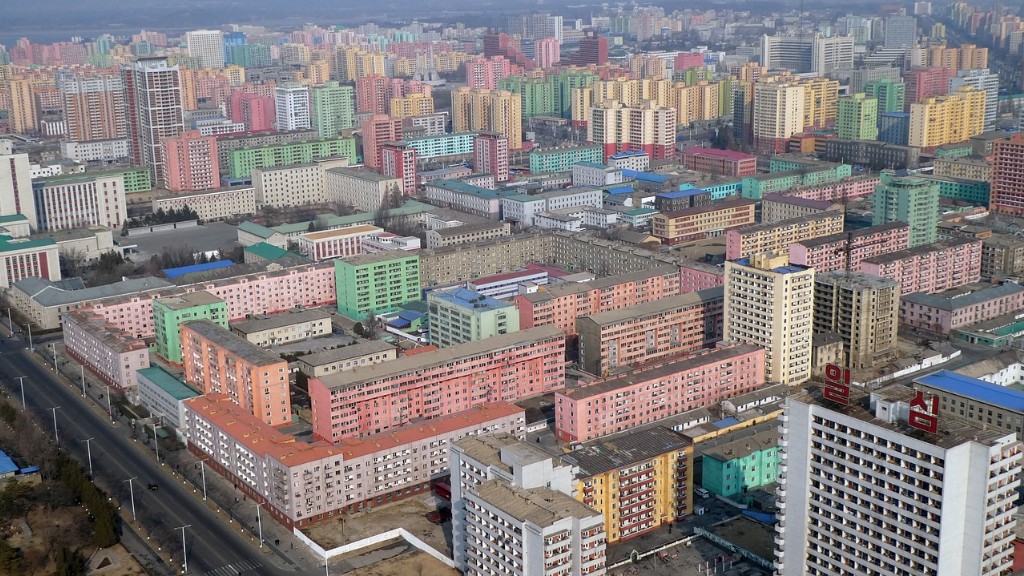Economic Factors for North Korea
North Korea is an isolated country ruled by the Kim family dynasty, with a closed economy and a closed political system. Despite international economic and political pressure, North Korea has been able to maintain its current oppressive system for decades. This is due to a number of factors, including economics.
The lack of integration in the global economy is a major factor why North Korea has managed to sustain its oppressive regime in power. This detached nation relies mostly on its own resources, allowing its government to bypass international rules and regulations and operate under its own terms. Due to being self-sufficient and efficient in terms of its economy, North Korea’s economy is not as affected by imposed sanctions as that of other nations.
In addition, North Korea’s survival depends on its citizens’ access to food, water and essential goods. As a result, the government uses its resources to ensure that the basic needs of its people are met, even going as far as to restrict its people’s freedom in order to guarantee a consistent source of income. This results in a population that is mostly devoted to the system.
Another factor that contributes to North Korea’s stability is the fact that the country has a large reserve of mineral resources. This strategic advantage allows the country to use its natural resources to generate income and invest in its military. The nation also relies heavily on foreign investments and humanitarian aid from other countries.
Political Reasons for North Korea
Apart from the economic causes for why North Korea has been able to sustain its oppressive rule, there are also political reasons. The system of government in place in North Korea is a hereditary dictatorship led by the Kim family dynasty. This type of regime allows a greater degree of control over its citizens, granting the government the ability to impose tight systems of surveillance and censorship.
Furthermore, North Korea’s party-state is largely independent from major international organizations and institutions, such as the United Nations, the World Bank and the International Monetary Fund. North Korea’s isolation from the rest of the world makes it difficult for the international community to hold the nation accountable for its actions.
Additionally, North Korea is a nuclear power, making it a formidable adversary to its neighbors. This level of military might grants North Korea a degree of authority that allows it to extend its control of the region and counter any potential external threats.
Another reason why North Korea has been able to avoid being stopped by other countries is due to the fact that it has staunchly maintained its reputation as a dogmatic nationalist state. The nation defends its sovereignty at all costs, making it unlikely for external powers to intervene.
China’s Involvement
China is a key ally of North Korea, who provides it with the economic, political and military support it needs to remain in power. China is North Korea’s largest trading partner, providing it with crucial supplies and investment. Over the years, China has invested vast amounts of money in North Korea and given diplomatic and military protection to the state.
China is also a major source of political support for North Korea. As a permanent member of the UN Security Council, China has used its veto power to shield North Korea from any potential international sanctions. This has allowed North Korea to bypass diplomatic pressure, allowing the oppressive government to remain in power.
China has also supported North Korea’s nuclear ambition. China has provided North Korea with the resources and technology required to build its nuclear weapons and ballistic missiles, in addition to financial assistance and diplomatic support.
Other International Factors
The international community has had limited success in imposing sanctions on North Korea over the years, due to its ability to bypass them and engage in countermeasures. North Korea has employed diversionary tactics to avoid detection and repurpose sanctions.
North Korea also receives support from other countries in the international arena. Russia has been a longtime ally of North Korea and has sent aid to the country in the form of food, fuel and military supplies. Russia has also diplomatically supported North Korea by advocating for the country in the United Nations and providing diplomatic protection.
Other countries, such as Japan and South Korea, have also provided economic aid to North Korea over the years. This economic assistance has enabled North Korea to continue its oppressive regime.
Consequences of International Inaction
The lack of strong international action to stop North Korea has had serious consequences for the region. North Korea has continued its oppressive rule, posing a serious threat to international peace and security.
The oppressive regime has caused human rights abuses, including mistreatment of political prisoners and forced labor, as well as economic disruption and deterioration. North Korea’s nuclear program has worsened the security situation in the region, and the North Korean government continues to carry out illegal activities such as illicit arms trafficking and money laundering.
The international community’s lack of decisive action and the effects of North Korea’s oppressive rule serve to illustrate the importance of a unified international response to global security threats.
Role of the Global Community
The global community has a responsibility to take action to end the oppressive rule of North Korea and ensure the safety of its citizens. However, this task is complicated by the fact that North Korea is an isolated and powerful nation with a strong military and nuclear capabilities.
The most effective way for the international community to counter North Korea’s oppressive regime is through multilateral diplomacy and economic sanctions. Countries must work together to place pressure on North Korea and show unity towards resolving the issue.
International civil society organizations play an important role in pointing out human rights abuses in North Korea. They are a vital part in disseminating information about the country’s human rights violations to the public and international organizations.
Ultimately, building support for action to stop North Korea will require the commitment of the entire international community. Countries must work together to keep the region safe and secure, while upholding the fundamental rights of North Koreans.
Media Role in Progress
The role of media in the fight against North Korea’s oppressive regime is crucial. Journalists and news media have an important role in bringing attention to North Korea’s human rights abuses, providing facts and reporting on the situation in the country.
The media can use its platform to raise public awareness and create dialogue about North Korea’s oppressive rule. News outlets are also a key source of information for policymakers in deciding how best to address the issue.
Furthermore, the media should be responsible in its reporting of North Korea and strive to provide balanced and accurate coverage. This will help avoid any sensationalized coverage that could overshadow the reality of the situation.
In addition to its news reporting, the media can also be used to begin conversations and mobilize global action. International media outlets should use their influence to pressure North Korea to end its repressive rule and uphold human rights.
Protests & Disobedience
Protests against North Korea have been instrumental in pushing for change in the country. Through speeches, demonstrations and other forms of dissent, ordinary citizens have been able to show their solidarity and stand up against the oppressive regime.
Moreover, organized civil disobedience movements have been effective in pressuring North Korea to end its human rights abuses. These movements involve strategically non-violent protests and acts of civil disobedience that are intended to disrupt the oppressive system.
In addition to protests and civil disobedience, international organizations such as Amnesty International have actively campaigned for human rights for North Korea and advocated for the release of political prisoners. These organizations have also provided legal assistance to victims of torture and other forms of abuse.
Finally, emerging online activism and social media campaigns have also been instrumental in pushing for change in North Korea. Social media has enabled ordinary citizens to communicate and organize protests and campaigns to bring attention to North Korea’s oppressive rule.
Effect of Professional Sanctions
Professional sanctions are an effective way of holding North Korean officials and foreign entities accountable for their actions. These sanctions involve blocking access to certain markets, freezing assets and other measures designed to disrupt the activities of those involved in human rights abuses.
Government agencies, financial institutions and corporations must take responsibility for any individuals or entities they are collaborating with, and be mindful of the potential risks of providing services to anyone involved in North Korea’s oppressive rule. Professional sanctions can be used to ensure that actors in the international community are not complicit in any human rights abuses in the country.
These measures are particularly effective when combined with other methods, such as economic sanctions and targeted travel bans. By isolating government officials and entities, it is possible to send a strong message to those involved in North Korea’s oppressive regime.
Ultimately, professional sanctions can play a crucial role in deterring human rights violators and holding them accountable for their actions. This is an important step towards ending North Korea’s oppressive rule.


